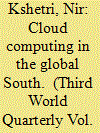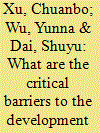| Srl | Item |
| 1 |
ID:
106661


|
|
|
|
|
| Publication |
2011.
|
| Summary/Abstract |
Cloud computing has started to transform economic activities in the global South. Many businesses are taking advantage of the pay-as-you-go model of the technology, and its scalability and flexibility features, and government agencies in the South have been investing in cloud-related mega-projects. Cloud-based mobile applications are becoming increasingly popular and the pervasiveness of cellphones means that the cloud may transform the way these devices are used. However, findings and conclusions drawn from surveys, studies and experiences of companies on the potential and impact of cloud computing in the developing world are inconsistent. This article reviews cloud diffusion in developing economies and examines some firms in the cloud's supply side in these economies to present a framework for evaluating the attractiveness of this technology in the context of evolving needs, capabilities and competitive positions. It examines how various determinants related to the development and structure of related industries, externality mechanisms and institutional legitimacy affect cloud-related performances and impacts.
|
|
|
|
|
|
|
|
|
|
|
|
|
|
|
|
| 2 |
ID:
176791


|
|
|
|
|
| Summary/Abstract |
Hydrogen fuel cell vehicle is one of the important modalities of the next generation of new energy vehicles. As the basic infrastructure of hydrogen fuel cell vehicles, hydrogen refueling stations (HRSs) have drawn attention from all social circles. However, hindered by various barriers, the development of HRSs is much slower than the Chinese government's expectation. Hence, this study aims to explore critical barriers of the HRS development in China based on a modified fuzzy decision-making trial and evaluation laboratory (DEMATEL) method. Firstly, a barrier list is identified through a literature survey and expert consultation, which consists of four categories (economic, technological, social and political-regulatory aspect) and 12 potential barriers. Later, considering the subjectivity of threshold setting in the traditional fuzzy DEMATEL method, the K-means clustering algorithm is utilized to optimize the threshold value, and thus a modified fuzzy DEMATEL approach is proposed to investigate the prominence of these barriers and the cause-effect relationships among them. The results show that six barriers are regarded as key barriers to China's HRS development, and corresponding policy measures are formulated to mitigate or eliminate these critical barriers.
|
|
|
|
|
|
|
|
|
|
|
|
|
|
|
|